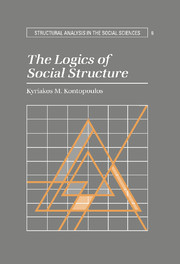Book contents
- Frontmatter
- Contents
- Preface
- Introduction
- Part I Metatheoretical considerations
- Part II Compositionist logics
- Part III Logics of hierarchy
- Part IV Heteracrchical logics
- Part V The phenomenology of social structures
- 12 Modalities and systems of interaction
- 13 Heterarchical levels of social structure
- 14 On structural totalities
- 15 In conclusion
- Appendix: The logics of structuration
- Glossary
- Bibliography
- Index
12 - Modalities and systems of interaction
Published online by Cambridge University Press: 24 October 2009
- Frontmatter
- Contents
- Preface
- Introduction
- Part I Metatheoretical considerations
- Part II Compositionist logics
- Part III Logics of hierarchy
- Part IV Heteracrchical logics
- Part V The phenomenology of social structures
- 12 Modalities and systems of interaction
- 13 Heterarchical levels of social structure
- 14 On structural totalities
- 15 In conclusion
- Appendix: The logics of structuration
- Glossary
- Bibliography
- Index
Summary
In this chapter we focus our analysis on the different types of social action implicated in the production of corresponding “systems of interaction,” capable of being “structured” in specific ways by appropriate “micrologics” (structuring principles, or structuring mechanisms). As in the general case of social structure, I would argue that, here too, we cannot speak of social action in the singular. Rather, our task is to specify the existential categories of social action in order to be able to link them properly to the relevant interaction systems they give rise to to and the possible structures they underdetermine. It is a tragedy for social science that no systematic analysis of the modalities of social action has ever been undertaken. Traditional interactional studies within the frameworks of the known symbolic and interpretative paradigms have always prioritized communicative action and understanding as the central mode and purpose of interaction and have shied away from alternative situations; alternatively, rational-purposive forms of analysis, particularly in economics, have attempted to show that the whole range of human behavior can be brought under the explanatory coverage of the instrumentalist-strategic paradigm. Consequently, a distinction has developed demarcating the sociological enterprise, with its emphasis on role-related, norm-related, and understanding-related considerations of social action, from the economic enterprise which prefers to build on utilitarian bases for the understanding of (instrumental) social action. Furthermore, the economistic tendency has many sympathizers within sociology and the other social sciences (Berger, Coleman, Elster, Hechter, arguably Zald, among others).
- Type
- Chapter
- Information
- The Logics of Social Structure , pp. 271 - 286Publisher: Cambridge University PressPrint publication year: 1993



